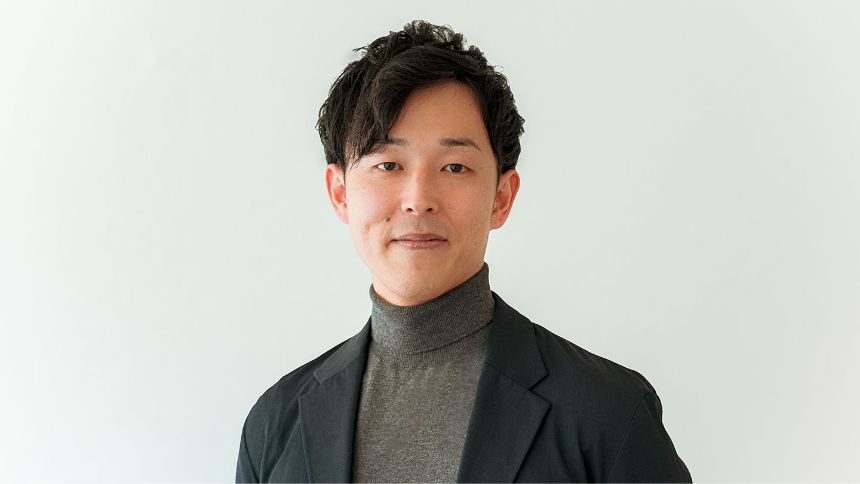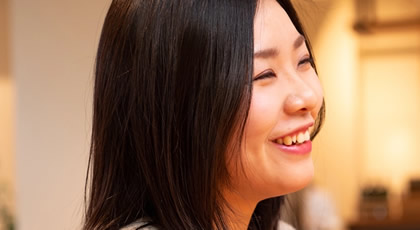
Rekindling the Initial Spark: A Focused Drive Toward the Ideal Future
Driven by a dream to become a coffee professional and one day open his own café, Shota Matsushita joined the green coffee importer S.Ishimitsu & Co., Ltd. straight out of university. Over 15 years, he gained hands-on experience across the coffee supply chain – managing green coffee quality, cupping, establishing a Shanghai subsidiary, green sourcing, and sales, and even spearheading marketing for roasted coffee in the food service sector. In April 2023, he joined TYPICA, where he now focuses on expanding partnerships with mid-to-large-scale roasters as a member of the Coffee Expert Team.
Nearly two years have passed since Matsushita joined TYPICA, drawn by its ambitious vision: “¥400 billion in transaction volume by 2030, with 33% of all Arabica coffee beans worldwide traded through TYPICA.” So, how does he feel now?

Rediscovering pure passion
Since 2019, TYPICA has been reshaping the coffee industry, enabling direct trade starting from just one 60kg bag. Initially catering to micro-roasters with up to a few dozen employees, the company has expanded its focus since 2023 to mid-to-large-scale roasters. Matsushita, as a core member of the Coffee Expert Team, is instrumental in driving this expansion.
“For me, client communication goes beyond just discussing coffee quality and pricing. It’s about building a shared vision and bringing like-minded partners on board to shape the future together. I often tell them, ‘The only way to solve the coffee industry’s so-called 2050 crisis is to support small-scale producers in continuing to grow coffee. Together, we can ensure coffee remains a beverage loved for generations to come.’”
When Matsushita first started reaching out to mid-to-large-scale roasters, many wouldn’t even entertain the idea of switching suppliers. Their sourcing channels were set, and the barriers felt insurmountable. But in recent months, the tide has started to turn.
“When we secure deals with companies that recognize the urgency of sustainability or the need to regain their competitive edge, it feels like real progress. It’s moments like these that make me truly feel we’re shaping a new era. Even in the early stages of discussions, just brainstorming the kind of future we want to create, and the one we believe is within reach, fills me with excitement.”
Coming from 15 years in a highly structured corporate environment, Matsushita knew that joining a startup would be a complete shift. He understood that past norms wouldn’t necessarily apply and approached his new role with a strong willingness to learn. Today, he finds that some of the most insightful ideas come from colleagues who joined after him.
“From day one, I was struck by the sheer enthusiasm and clarity of purpose among the team. Everyone was moving in the same direction, with no room for negativity. It’s refreshing to be in an environment where the team’s vision and mission are well-defined, and every member truly believes in it.
In our daily meetings as community managers, we don’t just talk about sales strategies – what to sell, where, and how. Instead, we keep our focus on the bigger picture: What kind of world are we trying to build? Being in that kind of environment brought me right back to the raw passion I had at 20, when I first knew I wanted to work in coffee.”

Out of pure love for coffee
Coffee first became Matsushita’s life in high school, though at first, coffee itself was just an afterthought. What really mattered were the moments – chatting with friends at Starbucks, going on dates, or cramming for exams.
As he spent more time in cafés, Matsushita began noticing subtle differences in flavor. It was the early 2000s, and the term “specialty coffee” was just beginning to emerge. Forward-thinking roasters and cafés were introducing traceable coffee, making him wonder: Why does coffee from the same country taste different from farm to farm? How can I brew it better? Before he knew it, what started as curiosity had turned into an obsession.
Over time, Matsushita developed a theory: While roasting and brewing are crucial, the real determining factor in coffee’s flavor is where and how it’s grown. He was particularly inspired by a store manager of Horiguchi Coffee, a pioneer in direct trade, whose passion for coffee origins resonated deeply with him. It was then that his dream took shape – he would become a coffee professional and, one day, open his own café.
When searching for a job as a student, Matsushita had one clear goal: to visit coffee farms. He believed that understanding production was key to making great coffee. He focused on roasters and trading companies with direct farm access, only applying to those that could take him to origin. When he finally secured a position at a company that aligned with his goals, he felt like he was on the right path.
“After joining the company, I was full of curiosity, asking my senior colleagues countless questions. So when I finally visited a coffee farm in my second year, it was an unforgettable experience. The heat of the blazing sun, the rich scent of the soil and trees – everything felt alive. Since then, I’ve visited many farms, and each time, I’m reminded that coffee is a gift from nature. Working in Japan, it’s easy to lose sight of that and start seeing coffee as just another manufactured product.”
But over time, the dream of opening his own café began to slip away. As he worked with roasters and cafés caught in price wars, he found himself catering to market needs rather than pursuing his passion. At some point, he came to a hard truth – love for coffee alone wouldn’t sustain a business.
“Getting married in my late twenties and having two children also made me more stability-focused and pragmatic. In that sense, although I had no hesitation about joining TYPICA, it was still a bold decision.”

Making game-changing impact
It was the fall of 2022 when TYPICA first caught Matsushita’s attention. While walking through SCAJ, Japan’s largest coffee trade show, he came across their booth, and something about it stuck with him.
The booth had the energy of a startup but none of the rough edges. It was polished, well-organized, and left a lasting impression. Matsushita began visiting TYPICA’s website now and then, and found himself increasingly drawn to their focus, not just on coffee, but on the people behind it.
By coincidence, Matsushita was in the middle of his own global expansion efforts. He had started working on bringing Japanese-roasted coffee to international markets, aware that Japan’s shrinking population meant domestic demand would only decline. But inside his company, few seemed to share his sense of urgency. The project felt more like a side task than a priority.
Though his company provided a comfortable working environment, Matsushita couldn’t shake the feeling that his contributions weren’t fully recognized. As he started exploring new opportunities, he found himself attracted to companies with a global vision – bringing him straight to TYPICA.

“The moment my mind was made up was during my online interview. Hearing TYPICA’s vision of distributing 33% of Arabica coffee worldwide by 2030 was shocking in scale. But what truly pulled me in was imagining what the industry would look like if they actually made it happen. That was the kind of future I wanted to be part of.”
The coffee futures market is inherently volatile. With hedge funds pouring in speculative money purely for profit, prices swing wildly. Matsushita, caught in this whirlwind, has been at the mercy of these unpredictable fluctuations, especially during the price spikes of 2021 and 2022.
“Having to apologize to customers and ask them to accept price hikes was disheartening, especially because they were caused by market forces completely disconnected from coffee itself. And on top of that, my bonus got cut, which directly affected my own livelihood. But there was nothing I could do. The only option was to keep monitoring the market, making predictions, and trying to minimize the impact as much as possible.
Until then, it never even occurred to me to question the way coffee prices are set. But if TYPICA’s vision becomes a reality at a scale large enough to make an impact, it could be a game-changer. The idea of shifting price control away from speculative markets and into the hands of those actually involved in coffee started to feel like a real possibility.”

Living authentically
In business, there’s often a gap between what people truly feel and what they say. Even those who start out with the purest intentions eventually learn that the world doesn’t run on ideals alone. Many bury their true thoughts, playing the game to get by. After 15 years in the workforce, Matsushita had witnessed this firsthand, but he could never bring himself to simply go along with it.
“I think the reason I was able to close deals was because I approached my work with a sense of sincerity. Sure, there were times I had to sell things I wasn’t personally excited about. That’s just part of the job. But I never tried to hook clients with discounts or flashy talk. I always tried to win people over by focusing on the real value of the product.”
During the final months of his previous job, Matsushita took on a project that felt like the culmination of his 10-plus-year career. He had built a relationship with a large restaurant chain, and when the opportunity arose to create their original coffee blend, he proposed something he truly believed in. As a result, he secured a major contract.
“In my previous job, I focused on coffee’s flavor, quality, and technical specifications. But at TYPICA, the focus is on the producers themselves. Rather than buyers dropping out when prices rise, I believe in fostering relationships where people continue to support each other, even in difficult times. If that shift becomes the norm, I think it could truly change the world. Of course, there are plenty of challenges, but I’ve never felt discouraged because we’re striving toward something bigger.
I’ll be 40 this year. In my younger days, I was often driven by pure enthusiasm, simply because I didn’t know any better. Now, with knowledge, experience, and a clear understanding of what’s needed, I can be more strategic, allocating resources where they matter most. After 15 years of battling volatile markets, I want to help bring coffee pricing back to what’s fair based on real demand, ensuring a future where producers, roasters, and consumers all benefit.”

Meanwhile, transitioning from a mid-sized company with clearly defined roles to a startup has posed new challenges for Matsushita. At TYPICA, where everyone is encouraged to take full ownership of their work, the expectations were entirely different.
“In my previous job, my role was clear. I spent two years acquiring new clients or three years making a newly launched China office profitable. But at TYPICA, the approach is different. Instead of focusing only on immediate targets, I need to step back, consider the long-term vision, and work backward to determine what actions matter most today.
Put another way, it’s not enough to just see areas where the company could improve – I have the opportunity to take action and drive real change. In day-to-day work, it’s easy to become overly focused on hitting KPIs and unconsciously divide tasks into ‘my role’ and ‘everything else.’ But I want to move beyond that mindset and fully own my role as more than just a player. I want to lead with initiative.”























